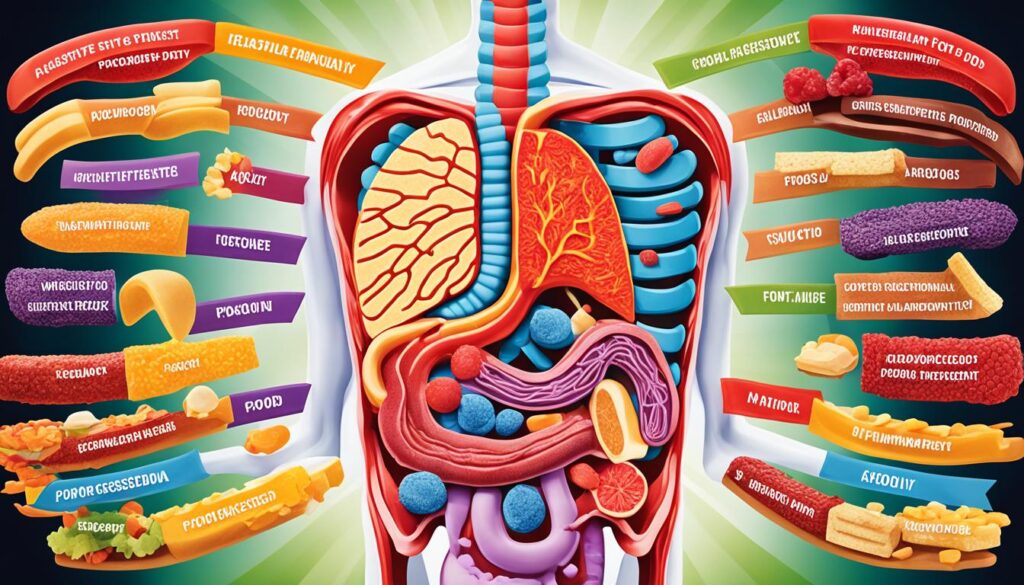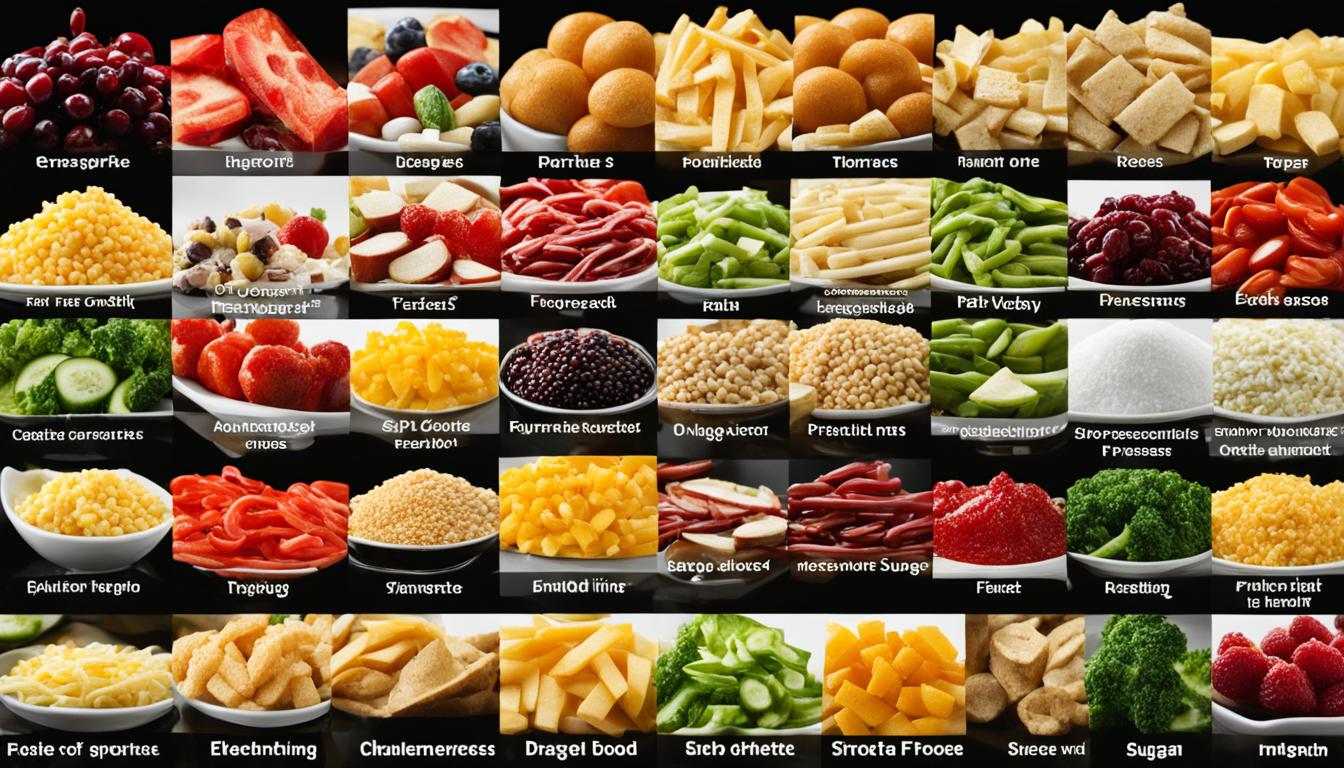Did you know that processed foods make up a significant portion of the American diet? Studies show that over 70% of the calories consumed in the United States come from processed foods. While these convenient and readily available options may seem appealing, their hidden dangers can have a profound impact on our health and well-being.
In this section, we will explore the side effects of eating processed foods and the dangers they pose to our wellbeing. From nutrient deficiencies to chronic diseases, we will uncover the truth behind the processed food epidemic and shed light on the risks associated with this prevalent dietary choice.
Key Takeaways:
- Processed foods make up over 70% of the calories consumed in the United States.
- Eating processed foods can have serious side effects on our health.
- Nutrient deficiencies and chronic diseases are common risks associated with processed food consumption.
Decoding the Impact of Processed Food on Health
Processed food has a significant impact on our health. In this section, we will delve into the various ways in which processed food can negatively affect our well-being. From nutrient deficiencies to chronic diseases, we will decode the detrimental impact of processed food on our overall health.
The Hidden Culprits: Understanding Processed Food Additives
Processed food is packed with additives and preservatives that can have a range of negative effects on our health. These hidden ingredients can significantly impact our bodies and contribute to various health issues. It is crucial to understand the dangers associated with these additives to make informed decisions about the foods we consume.
Disguised Dangers in Additives and Preservatives
Many processed foods contain additives and preservatives that are often disguised under different names or labelled as “natural flavors” to enhance taste, texture, and color. These additives can have harmful effects on our health, including allergic reactions, digestive problems, and even carcinogenic properties. Additives like artificial sweeteners, high-fructose corn syrup, and artificial colorings have been linked to obesity, diabetes, and other chronic diseases.
Deceptive Nutrient Replacement Tactics in Food Processing
One deceptive tactic used in food processing is the replacement of essential nutrients with synthetic alternatives. Processing can strip foods of their natural nutrients and replace them with artificial additives that mimic the taste or texture. For example, refined grains may be stripped of fiber and important vitamins, only to have synthetic vitamins added back in inadequate amounts. These nutrient replacements can result in imbalances in our diet and contribute to nutritional deficiencies.
Furthermore, some processed foods advertise being enriched or fortified with specific nutrients. However, these added nutrients often do not compensate for the loss of natural nutrients during processing, leading to an inadequate nutritional profile.
Identifying Additives on Labels: A Guide to Transparency
Identifying additives on food labels can be challenging due to their use of scientific or technical names. However, being able to recognize these additives is essential for making informed choices about the foods we consume. Look for common additives such as monosodium glutamate (MSG), sodium nitrite, artificial sweeteners, and artificial colors. Understanding these additives and their potential health risks allows us to be more conscious consumers and prioritize our well-being.
| Additive | Potential Health Effects |
|---|---|
| Monosodium Glutamate (MSG) | Headaches, nausea, allergic reactions |
| Sodium Nitrite | Linked to an increased risk of cancer |
| Artificial Sweeteners | Associated with weight gain, diabetes, and metabolic disorders |
| Artificial Colors | Potential hyperactivity and behavioral issues in children |
Processed Food Disadvantages: From Digestion to Chronic Disease
The disadvantages of processed food extend beyond their impact on our health. In this section, we will explore the negative effects of processed food on our digestion and its role in the development of chronic diseases. By understanding these disadvantages, we can make more informed choices about the foods we consume.
Processed foods, which undergo various mechanical and chemical processes to extend their shelf life, often lack the essential nutrients needed for optimal digestion. These foods are typically high in refined carbohydrates, unhealthy fats, and added sugars, while being low in fiber, vitamins, and minerals. As a result, they can disrupt our digestive system, leading to issues such as constipation, bloating, and gas.
Furthermore, a diet consisting of processed foods has been linked to a higher risk of developing chronic diseases. Numerous studies have shown a positive correlation between the consumption of processed foods and conditions such as obesity, type 2 diabetes, heart disease, and certain types of cancer. This association is thought to be influenced by the excessive calorie intake, increased inflammation, and detrimental effects on insulin sensitivity caused by these foods.

By opting for whole, unprocessed foods instead of processed options, we can provide our bodies with the essential nutrients they need to maintain optimal digestion and reduce the risk of chronic diseases. It is important to prioritize fresh fruits and vegetables, lean proteins, whole grains, and healthy fats in our diets.
| Diseases Caused by Processed Foods | Ultra Processed Foods List | Processed Foods Examples |
|---|---|---|
| Obesity | Sugary cereals | Frozen pizza |
| Type 2 diabetes | Packaged snacks | Processed deli meats |
| Heart disease | Soft drinks | Canned soups |
| Certain types of cancer | Fast food burgers | Instant noodles |
By being aware of the diseases caused by processed foods, familiarizing ourselves with the ultra processed foods list, and recognizing common processed foods examples, we can make more mindful choices about what we eat. Prioritizing whole, nutritious options can help us support our digestive health and reduce the risk of chronic diseases.
Side Effects of Eating Processed Foods: A Comprehensive Overview
Eating processed foods can have significant health risks that extend beyond their convenience and taste. In this section, we will provide a comprehensive overview of the various side effects associated with consuming processed foods. By understanding these risks, we can make informed choices about our dietary habits and take proactive steps to safeguard our health.
Unpacking the Obesity and Diabetes Connection
One of the most concerning side effects of consuming processed foods is their link to obesity and diabetes. These foods are often high in added sugars, unhealthy fats, and calories, which can lead to weight gain and increase the risk of developing obesity-related conditions, such as type 2 diabetes. Processed foods are also low in essential nutrients, making it harder for the body to maintain a healthy weight and manage blood sugar levels. Understanding this connection is crucial for individuals looking to make healthier choices and prevent these chronic diseases.
Tackling Hypertension and Cardiovascular Risks
Highly processed foods often contain excessive amounts of sodium, unhealthy fats, and artificial additives, all of which can contribute to hypertension and cardiovascular risks. Regular consumption of these foods can elevate blood pressure and cholesterol levels, increasing the likelihood of heart disease, stroke, and other cardiovascular complications. By reducing our intake of processed foods, we can lower our risk of developing these health problems and protect our heart health.
Consequences on Mental Health: Anxiety and Depression Links
While the focus is often on the physical health risks, processed foods can also have detrimental effects on mental well-being. Research suggests that a diet high in processed foods is associated with an increased risk of developing anxiety and depression. This may be due to the lack of essential nutrients and the presence of artificial additives that can disrupt brain chemistry and negatively impact mood and mental health. Recognizing the connection between processed foods and mental health is crucial for promoting overall well-being.

The image above visually represents the harmful effects of consuming processed foods on our health. It serves as a reminder of the importance of making informed decisions about the foods we eat and the potential consequences they can have.
Risks of Consuming Processed Foods: The Addictive Nature of Convenience
Processed foods may seem convenient and tempting, but they come with a hidden risk – their addictive nature. These highly processed items are designed to be irresistible, leading to overeating and food addiction. Understanding how processed foods trigger these behaviors is crucial for maintaining a healthy diet and overall well-being.
How Processed Foods Trigger Overeating and Food Addiction
Processed foods are carefully engineered to stimulate our taste buds and trigger pleasurable sensations in our brains. They contain a combination of unhealthy ingredients, such as refined sugars, unhealthy fats, and artificial additives, which can hijack our natural appetite regulation systems.
These foods often lack essential nutrients like fiber and protein, which are crucial for satiety. As a result, consuming processed foods can lead to increased cravings and a cycle of overeating. The addictive nature of processed foods can make it challenging to resist temptations and control portion sizes, ultimately leading to weight gain and related health issues.
The Role of Processed Foods in Craving Development
Processed foods not only trigger overeating but also contribute to the development of cravings. The high levels of added sugars, artificial flavors, and salt found in processed foods can create a dependence on these flavors, making it difficult to enjoy the natural tastes of whole foods.
Moreover, the rapid spike in blood sugar levels caused by consuming processed foods can lead to cravings for more sugary and high-calorie options. This constant cycle of craving and indulgence takes a toll on our health and makes it harder to establish a balanced and varied diet.

Understanding the addictive nature of processed foods is essential for avoiding these risks and making informed food choices. By opting for whole, unprocessed foods, we can break free from the cycle of addiction and prioritize our health and well-being.
Championing Healthy Alternatives: Swapping Out Processed for Nutritious
Despite the risks associated with processed foods, there are plenty of healthy alternatives available. It’s important to prioritize our health by swapping out processed foods for nutritious options. By incorporating more whole foods into our diets and choosing fresh, unprocessed ingredients, we can significantly improve our overall well-being.
When it comes to selecting healthy processed foods, it’s essential to focus on nutrient-dense options that provide essential vitamins, minerals, and antioxidants. These include:
- Fruits and vegetables: Rich in fiber, vitamins, and minerals, these colorful foods should form the foundation of a balanced diet.
- Whole grains: Opt for whole grains like quinoa, brown rice, and whole wheat bread, which provide more fiber and nutrients compared to refined grains.
- Lean protein sources: Choose lean meats, poultry, fish, legumes, and tofu to meet your protein needs without the added unhealthy fats.
- Dairy and dairy alternatives: Look for low-fat milk, yogurt, and cheese, or choose dairy-free alternatives like almond or soy milk.
- Healthy fats: Incorporate sources of healthy fats, such as avocados, nuts, seeds, and olive oil, into your meals for optimal nutrition.
In addition to making these food choices, it’s important to be mindful of portion sizes and practice mindful eating. By listening to our bodies and paying attention to hunger and fullness cues, we can foster a healthier relationship with food and avoid overconsumption.
Remember, small changes can make a big difference in our health. By championing healthy alternatives and prioritizing nutritious, whole foods, we can take control of our well-being and make positive, lasting changes to our diets.

Conclusion
In conclusion, understanding the impact of processed food on health and the harmful effects of eating processed foods is vital for creating a healthier future. By embracing change in our eating habits and taking action to combat the processed food epidemic, we can protect our health and well-being. Together, we can make a difference and promote a shift towards nutritious, unprocessed foods.
Embracing Change for a Healthier Future
It is time for us to take ownership of our health and make conscious choices about the foods we consume. By prioritizing fresh, whole foods and minimizing our reliance on processed options, we can improve our nutrition, reduce the risk of chronic diseases, and enhance our overall well-being. Let us embrace this change and empower ourselves to lead healthier lives.
Mobilizing Action Against Processed Food Epidemic
The processed food epidemic is a significant threat to our health and demands a collective response. As consumers, we can demand greater transparency from food manufacturers by carefully reading and understanding food labels. By advocating for stricter regulations and supporting initiatives that promote nutritious eating, we can mobilize action against the processed food epidemic. Together, we can create a healthier food environment for present and future generations.
FAQ
What are the side effects of eating processed foods?
Eating processed foods can lead to various side effects such as nutrient deficiencies, chronic diseases, obesity, diabetes, hypertension, cardiovascular risks, and mental health issues like anxiety and depression.
Why are processed foods bad for our health?
Processed foods contain additives, preservatives, and hidden dangers that can negatively affect our bodies. They can also lead to digestive issues and contribute to the development of chronic diseases.
What are the harmful effects of processed food additives?
Processed food additives can have negative impacts on our health, including allergic reactions, hormonal disturbances, and increased risks of certain diseases. It’s important to be aware of these additives and how they can affect our bodies.
How can I identify additives in processed foods?
To identify additives in processed foods, it is important to read food labels carefully. Look out for ingredient lists that include artificial colors, flavors, preservatives, and other chemical additives.
What diseases can be caused by consuming processed foods?
Consuming processed foods can contribute to the development of a range of diseases, including obesity, diabetes, cardiovascular diseases, certain types of cancer, and autoimmune disorders.
How do ultra-processed foods affect our health?
Ultra-processed foods have been linked to numerous health issues, including obesity, diabetes, high blood pressure, heart disease, and even increased mortality rates. Their high levels of additives, unhealthy fats, and added sugars can have detrimental effects on our health.
How do processed foods contribute to food addiction?
Processed foods can be addictive due to their high levels of sugar, salt, unhealthy fats, and artificial additives. These elements can trigger overeating, cravings, and contribute to food addiction, making it challenging to maintain a healthy diet.
What are some healthy alternatives to processed foods?
Instead of processed foods, opt for fresh, unprocessed ingredients. Incorporate more whole foods into your diet, including fruits, vegetables, lean proteins, whole grains, and healthy fats.




